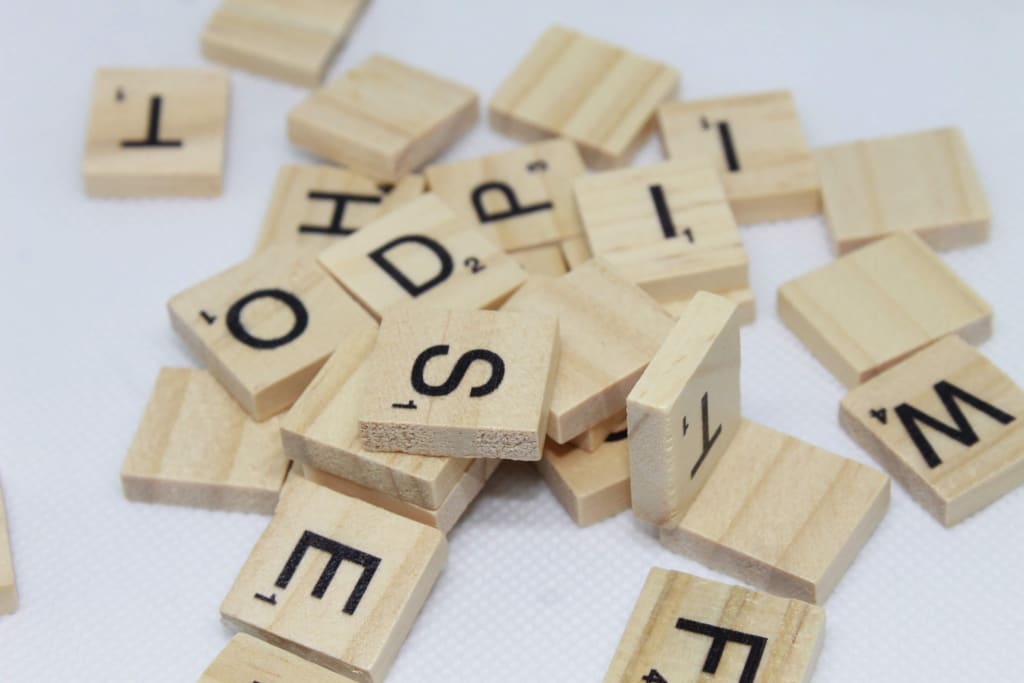Who Invented Scrabble?
An Entrepreneur in The Great Depression

The grid of perfectly scaled squares hinting of an underlying respect for structure, the meticulously planned numbering system, the lettered tiles, and even the wooden letter holder that resembles a sample of ceiling molding might be clues to the profession of the inventor of Scrabble. Alfred Mosher Butts, born in Poughkeepsie, New York in 1899, graduated from the University of Pennsylvania in 1924 with a degree in architecture and soon after joined the New York firm of Holden, McLaughlin & Associates. In 1931, however, suffering from the devastating economic effects of America's Great Depression, the architectural firm was forced to shut its doors, and Butts, like the majority of Americans, was laid off from his job.
Believing that “Idle Hands are the devil's workshop”, Butts, who was bored, broke, and highly creative filled the hours with writing, painting, and illustrating until he settled on the idea of drawing a plan for a new game. He thought such a project would focus his mind as well as fill his empty pockets should he be able to sell it.
Butts did a survey of the games available at that time and categorized them into games of pure chance with winners decided by a throw of the dice or a show of playing cards, those like Chess and Bridge which rely heavily on skill, memory, and strategy, and finally, word games like crosswords and anagrams. He decided to create a word game that would call on both the player's skill and the luck of the draw.
Deciding that the game would rely on players forming words from a selection of letters with assigned numerical values for scoring. Butts, with plodding diligence, read the front pages of the New York Times, New York Herald Tribune, and articles in the Saturday Evening Post to evaluate the frequency of letters in the publications. Based on that information, he made calculations deciding on the number of times each letter in the alphabet should appear in the game. His initial breakdown of word frequency survived unchanged throughout Scrabble's history.
Other features of the prototype game, however, which Butts called It. then Lexico, and finally Criss Cross Words, have gone through frequent transformations. The first game of Scrabble had no board and each square was made of cardboard and hand-lettered by Butts. When the idea of tiles evolved those too were hand-lettered and pasted onto squares of balsa wood. After a period of obsessive tinkering and tweaking the details of his creations, he began soliciting game manufacturers to see if they had an interest in buying Criss Cross Words. Both Parker Brothers and Milton Bradley, the leading game makers at the time, rejected the product. Undeterred, he continued to perfect and polish his creation.
Using his architectural drafting equipment, he fashioned a board for Criss Cross Words, reproduced the board cover on blueprint paper, and pasted them onto chess boards. He assigned double and triple word score values to specific squares on the board. With an eye to making Criss-Cross words more difficult, Butts decreased the number of S’s in the game to four when he saw that pluralizing the end of the words made the game less challenging. He also changed the number of letters in play from nine to seven and then he once again made the rounds of the game makers only to be rebuffed again.
Butts tried making the game in his living room and selling it himself for $2 Plus $0.25 for shipping. He sold Criss-Cross words by filling orders from customers who were hearing positive accounts of the game from friends and relatives. These early customers were mainly East Coast residents from Washington DC, New York, and Pennsylvania. He made and sent out approximately 100 games and in each game, he painstakingly hand-lettered each piece, copied the rules, and searched in stores for appropriate-sized boxes for shipping.
In 1948, James Brunot, a word game lover who had played Criss Cross Words, came on the scene just when Butrs was becoming disenchanted with a project that required long, tedious hours of labor resulting in little or no profit. Brunot, who lived in Newtown Connecticut, and worked in New York City, was anxious to start a home-based business and bring to an end his daily two-hour commute to Manhattan. He asked Butts for the rights to manufacture and distribute the game in return for a small portion of the profits. Butts, who had gotten his job back at Holden, McLaughlin & Associates and was no longer dependent on profiting solely from the game, agreed to the deal.
Brunot then put his own stamp on the game by devising a rule awarding 50 points for using all seven letters at once, by moving the starting square from the upper left-hand corner to the center of the board, giving the center square a double word score, and changing the colors on the board. Most importantly, he changed the name of the game to Scrabble, a word that means “to grope frantically”, because he thought the word accurately described some aspects of the game in play.
Brunot trademarked the name, obtained a copyright on the board design, and started producing the game in the summer of 1948. He and his wife started assembling the game in the kitchen of their Connecticut cottage and sent them to Butts's former customers with an order form in each set. They soon moved their operation to an abandoned schoolhouse where the Brunots and a band of friends produced a labor-intensive 12 games per hour. They weren't equipped and did not have time to make boards, so Brunot ordered a few hundred of them from the game manufacturing firm of Selchow & Righter.
The new owners had only modest success with their revamped game. By 1949, they had sold just under 2,500 sets of Scrabble, but in 1950 and 1951 sales dropped and Brunot lost money. Sales flattened out to a steady 200 games a week by 1952, yet Brunot wasn't happy with the bottom line and was thinking about selling his little enterprise. It was a lucky roll of the dice that he did not let go of his struggling business at that time because a random series of events was about to turn Scrabble into one of the best- selling games in the world.
When the Brunots returned from a trip to Kentucky expecting to find and fill the usual order for 200 sets, they instead found a request for an astounding 2,500 sets followed by 3,000 more for the next week. The person behind this phenomenal spike in orders was Jack Strauss, then president and chairman of Macy's department store, who had enjoyed playing Scrabble so much during his vacation on Long Island that when he returned to the store he ordered the toy and game department to stock their shelves with the game.
After Macy's placed the order, other retailers got into the game and the orders continued to skyrocket. While the increasing popularity of the game was good news, Brunot and his crew struggled to keep up with orders, which sometimes totaled in the tens of thousands. He had 35 employees working two shifts in an abandoned schoolhouse to produce 6,000 games a week. In March 1953, after conferring with Butts, Brunot licensed the production and marketing of Scrabble to Selchow & Righter.
In the same year, J. W. Spear & Sons acquired the rights to distribute the game in the United Kingdom, and later in Australia where it met with immediate success. Brunot, who wanted to keep a hand in the game on a smaller scale, converted the machinery in his Connecticut factory and started manufacturing just the $10 Red and White edition of Scrabble.
By the end of 1953, sales had jumped nearly 200% and high demand created a shortage of the game for the next three years. Its unavailability only increased Scrabble’s cachet and knock-off game manufacturers began producing cheap imitations of Scrabble. Brunot's lawyers fought copyright infringement suits while Selchow and Righter urged customers to be patient and wait for the genuine article.
Brunot became something of a celebrity, profiled by the major publications of the 1950s as a man behind Scrabble's phenomenal success while Butts was portrayed as the self-effacing intellectual inventor of the word maze. The two men, who had a distant, formal relationship, always had different philosophies about the game. Brunot saw it as a game to be enjoyed and didn't understand some players' obsessive mincing over the game's rules on what constituted proper word usage. Butts, on the other hand, was a perfectionist and thought such questions were relevant and enjoyed answering the players’ questions.
The game's popularity continued over the years and in 1950 nearly 4 million games of Scrabble were sold. The breakdown in sales is more than 2.5 million for standard sets, 1 million cardboard sets, and the rest in foreign editions. The Braille Edition was launched in 1954 and the game outsold every other board game at the time. In the meantime, Selchow & Righter produced and promoted travel sets, Junior sets, and revolving board sets to avid Scrabble customers. In the late 1960’s after the death of his wife, Brunot was eager to retire and sell the game outright to Selchow & Righter. Butts was against the sale at first but finally agreed. In early 1971, terms of the sale were drawn up and both men signed on. In 1984, James Brunot died at the age of 82, Alfred Butts died in 1993 at the age of 93, and enjoyed some late-in-life celebrity as a guest on talk shows and at annual Scrabble Tournaments and competitions.
In 1986, Selchow sold the rights to Scrabble to Coleco who soon after went out of business. Its primary assets, Scrabble and Parcheesi, were sold to Hasbro, a company that owns Milton Bradley, the same company that roundly rejected Alfred Butts’ game 50 years before. The game is now sold in 121 countries around the world and translated into 29 different languages and is found in one out of every three homes.
Facts and statistics aside, one of the darkest periods in the country's history produced one of its most popular, stimulating, and entertaining pastimes. One man's devotion to precision and perfection and another man's shrewd business sense kept the game alive long enough for it to thrive and prosper.
About the Creator
Carol Driscoll
Carol is a freelance writer, compulsive reader, and somewhat sociable introvert.
Enjoyed the story? Support the Creator.
Subscribe for free to receive all their stories in your feed. You could also pledge your support or give them a one-off tip, letting them know you appreciate their work.
Reader insights
Outstanding
Excellent work. Looking forward to reading more!
Top insights
Easy to read and follow
Well-structured & engaging content
Expert insights and opinions
Arguments were carefully researched and presented







Comments (6)
Beautifully written!
I love Scrabble, and I’m the perfectionist player that no one will play with anymore. Great article.
Fantastic work. I still play Scrabble today and I still have a lot of love for the game.
Excellent research! I learned a lot! Thanks so much for sharing!
Thanks so much, Heather. Your Scrabble games with your grampa are priceless. I have a lot of fond memories of the game, too.
I really enjoyed this, thank you for your hard work researching and writing it. I have very fond memories of playing this game with my grampa. He was very good at inventing words that sounded believable but got out the dictionary if you used a word he didn't recognize. Loved learning the history of the game.